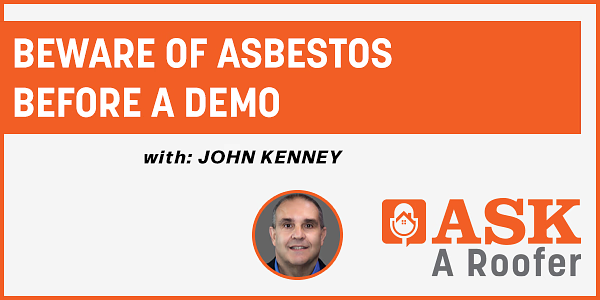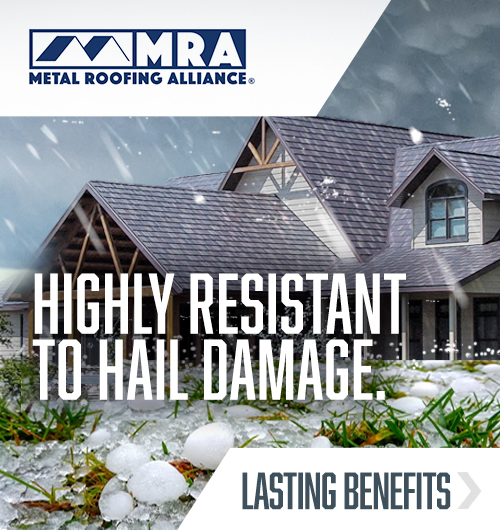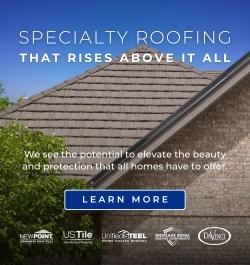What Questions Should You Be Asking About Siding? - PODCAST TRANSCRIPT
April 24, 2024 at 12:00 p.m.Editor's note: The following is the transcript of a live interview with Randy Kruse and Steve Kruse of Kruse Brothers and LP Building Solutions. You can read the interview below or listen to the podcast.
Alice Reynolds: Welcome to the AskARoofer Podcast, a podcast for people with roofs. My name is Alice Reynolds. I'm a new homeowner.
Megan Ellsworth: And my name is Megan Ellsworth, a roofing enthusiast, and we are with RoofersCoffeeShop.
Alice Reynolds: We want to share the knowledge of the contractors we work with every day with home and building owners.
Megan Ellsworth: So please join us as we talk with industry experts, roofing contractors, business owners, and more to answer all of your burning questions about the health and maintenance of your roof.
All right. Hello everyone. My name is Megan Ellsworth here at RoofersCoffeeShop and askaroofer.com. And I'm with my co-host Alice. Hey, Alice.
Alice Reynolds: Hi Megan.
Megan Ellsworth: Glad to be back in the swing of things. Glad you're back from maternity leave and really excited to be chatting with the Kruse Brothers today. Hi guys.
Randy Kruse: Hi, how are you?
Steve Kruse: How are you?
Megan Ellsworth: I'm doing well. I'm so excited to hear all about your story, and so let's just dive right in and have you guys introduce yourselves.
Randy Kruse: Awesome. Well, I'm Randy Kruse. I've been in the siding industry for 30 years. That's a long time, but not as long as-
Megan Ellsworth: That's amazing.
Steve Kruse: Yeah, and I'm Steve Kruse. I got started in 1986, and I don't want to tell you how many years that's been.
Megan Ellsworth: And you guys have your own company called the Kruse Brothers. Do you want to just tell us a little bit about that too?
Randy Kruse: Yeah, actually, so the Kruse Brothers is a company that we started to give help back to the industry. So with our decades of experience that we giggle about and so on, we are still out in the field working and we see trends that are happening now that we can help contractors with, whether it's roofing or siding or any exterior stuff. We like to also transition that into using LP SmartSide Siding and Trim as well, and using some of our expertise with that.
Alice Reynolds: Well, you sound like the homeowner's dream. Just lots of experience and still working and know the trends and ready to give answers.
Randy Kruse: Yeah, it's nice to be able to work with homeowners, but at the same time work with other contractors as well so that they understand the nuances to today's technology. Why is the inspector asking me for questions or asking me questions about how I'm installing flashing, or why do I need this vapor barrier? Because while I'm the youngest in our family of the Kruse brothers, I'm the youngest of four, so I know what my brothers have done in the past for vapor barrier and what vapor barrier means now to a homeowner compared to the way vapor barrier was installed back in the nineties or eighties when you started. Right, Steve? Vapor barriers come a long way, and for a homeowner, it's an important part of the equation now.
Steve Kruse: Yeah, absolutely. When I first got started, we used a foil faced paper, if you will, that was perforated versus now we call it a building envelope, and it's a completely new system on the way we install vapor barrier.
Alice Reynolds: Wow. Yeah, lots. When you do your contracting business, do you do both roofing and siding? And from a homeowner's point of view, why is that a contractor that maybe I should consider or not consider?
Randy Kruse: Yeah, we do roofing, siding, windows, doors, so your exterior of your home maintenance, which includes that fascia and soffit. We think it's important that a homeowner chooses a contractor that does multi-tiered business like ours so that they have someone to work with in the future that if they have a problem, it's not always the roofing problem; they have a water leak, it's not always the siding issue or the roof. It's good to have a contractor that... and when it comes time to needing a new roof and you just had the siding done, you call the same person that you liked working with in the past. It doesn't mean it's going to cost you more, it just means that you're going to have somebody you trust.
Megan Ellsworth: Absolutely. That's so nice and convenient to your creating the relationship and you don't have to go and make another relationship basically. You're sticking with your friends. So how can a homeowner tell when it's time to reside and when it's time to call someone like you guys?
Randy Kruse: That's a good question for you, Steve.
Steve Kruse: Yeah. Oftentimes homeowners will have some sort of water leak or rotten decay, something that they can visually see, whether it's water in the home itself, or they'll be looking at the outside of the house and they'll see discoloration or some kind of what would appear to be a water drip or line coming down from pretty much a window area or a corner board area or something like that. So at that point, a homeowner may call a roofer because it's a water leak or a sider because of discoloration. But when you call a company that can do both, that's where they can actually look at the issue and decipher if it's a roof or a siding leak versus someone that may just blame somebody else, right?
Alice Reynolds: Yeah.
Steve Kruse: So being able to put a plan together to say, "Okay, the sighting is bad or the roof is bad, but these are the steps that you should take from this point." Whether it's a roof or a sighting.
Alice Reynolds: That makes so much sense. Yeah, because a company that specializes in just one might just say it's only this problem and only want to reroof your house. So if I decide that I'm going to re-side my home, what goes into considering the siding that I get from my home?
Randy Kruse: Oh, absolutely. I think a lot of that comes down to that visual inspection that Steve had talked about. So that visual inspection, if it's rock decay or on a conventional wood siding such as cedar or pine, maybe it's a visual inspection to vinyl siding and you see fade or wobbly or wavy siding, and what don't you want in the future? So do you want your house nice and straight and sturdy and with less drafts and so on? Then you consider what type of siding at that point, and then when the secondary thing would be, what color do you want? Color plays into what? Probably 90% of when you go and sell a job. Right, Steve? That people really go and want to change because of color.
Steve Kruse: It truly is. People tend to do a lot of research online. They also watch a lot of the do it yourself TV shows, and they look at color first, and then they look at the different accents or styles of siding. That's real important where you can update your home that may have been built in the fifties, sixties, seventies, or even eighties, and you can bring that home in today's style and trends. And being able to use LP SmartSide, they have a whole catalog of materials to be able to choose what type of siding works best for them as far as style goes and then in their catalog, they have all kinds of pictures and visual tools to use online as well.
Alice Reynolds: Cool. Yeah. What if your roof is a certain style? How do you consider your roof when having those options and making that choice?
Randy Kruse: That I think it goes to the middle of the LP SmartSide and Trim catalog to color. In the middle of the catalog you'll see expert finish. So if the roof is a color tone of brown, light or dark, there are contrasting colors or matching colors to that roof or to that roof color. So if you're today looking at putting on a new roof and you know in the future you're going to use a contractor that is going to do the siding, it's important to pick that roof color today and know in the future what your siding color might be later on. I used the example of today's trends of white siding with black windows, and what's very interesting is later on, what's going to go with that black window? So white is always going to look really good with that black window, but in the future, your windows are going to last a long, long time, just like your roof is, just like your siding is. But if you go with a real contrasting color that's very definitive, watch out for what your color choices are going to be later on.
Megan Ellsworth: That's interesting. It's interesting to hear that the white and the black is really popular because in my neighborhood right now in Denver, it's popping up everywhere, so it's interesting that you say that. So when you're a homeowner and you've decided, okay, I think it's time to reside, or you're looking to up your curb appeal, what questions should you be asking your contractor about the siding?
Randy Kruse: Yeah, that's awesome. That kind of goes into different catalogs, different print publications or exteriors of Instagram, interiors of Instagram, how you want your home to be modeled. Steve, I think you've talked and used the Designing the Person's Castle, right? For them, the exterior remodel is just as important as a kitchen. They drive in the driveway every day and see that exterior. They want to be proud of where they live and where they're at, and so when it comes to designing that exterior, don't be afraid to show your contractor your dreams. You said Denver, maybe it's a mountain house in the Western slope, and they have a split log siding on their home, and you're just done with that log style and your dream is to have board and batten and a nice big porch out the front. Don't be afraid to tell the contractor or show them a picture of what they can expect and what you say.
I want to be done with log siding right now, and I want to get into more of a conventional siding and I think when we look at regions in the country, we start to see that in Arizona, Florida, where they're trying to get away from stucco and they're using more lap siding. And so we're training people that we never thought we were going to train before. In Arizona what it's like to have lap siding in a stucco market or in Florida where they have block homes and they're installing LP SmartSide directly to those block homes to give a lap look to that house or board and batten.
Steve Kruse: Right, and to find that contractor, Randy mentioned Instagram and a couple of different social media platforms like that. If you are a roofing contractor doing siding, make sure that you have your own sets of pictures on your website. Make sure that you are putting them out on Instagram and using all those different social media advertising to get that out to a homeowner. So many times we'll look at someone's website or they don't have an Instagram handle, and the homeowners don't know if you are the right contractor for them because you are not showing what you can actually do. And if you're new in the siding business as a roofing contractor, there are plenty of images that are out there that you can use to show what you can do. You need to promote your business in that direction so homeowners understand the different things that you can do.
Megan Ellsworth: Absolutely. They're options. That's such a good point. Speaking of LP SmartSide siding, how does climate impact what kind of siding a homeowner should choose? Whether that's like maybe they're in a snowy area or they're in Florida, like you kind of mentioned stucco. What kind of siding dictates climate?
Steve Kruse: Well, in theory, when you're looking at an exterior product, the manufacturers all have their claim to fame. They all say that they're going to work in all 50 states and they're going to do well. However, when you look at a product such as LP SmartSide, LP Smart Side is engineered and made in such a way that it is the same formulation and the same product in all 50 states. That's important because if you are in the Northern Minnesota climate and LP SmartSide engineered wood product performs very, very well in the northern climate. When you go to the southern climates where there's termites, LP SmartSide has zinc borate in engineered, and in the product itself that wards off termites. Yeah, it's been tested.
Megan Ellsworth: Oh.
Steve Kruse: It's been tested that way since 1996 and before it was released to the market in '96. So when we think about the success of SmartSide and climate it's had success throughout all of the US from heavy snow areas to our area here in the Chicago market. You know, it's hot, it's cold, it's wet, it's snowy, we've got it all right here and that's where we've had that success since 2002. And a couple of other really cool things is when you're looking at winds such as the outer banks area on the East Coast, LP SmartSide can resist wind at over 150 miles per hour. Then the Midwest, as Randy was just mentioning, or even in the planes where you can have hail, it has a hail warranty as well.
Megan Ellsworth: Wow.
Alice Reynolds: Not only did it stand the climate over the US factors, but stands with the test of time.
Randy Kruse: Same formation since 1996, the same installation instructions. So when Steve says it works in, say, deep South Texas all the way to Northern Minnesota, and that climate change from there to those two points, it's been that success with pride. LP has a lot of pride in what their success has been throughout the country.
Megan Ellsworth: That's really interesting about the termite thing that you said. That's so interesting that they even thought about that.
Randy Kruse: With termites coming from an area where we don't really have termites where we live, we started talking about zinc borate, and zincs and borates and we would go down to a southern state and we would start talking about it and they'd say, "Oh, well yeah, it comes in powder form. We sprinkle that around our foundation to keep away the termites." And we're like, "Man, we don't even know anything about termites."
Alice Reynolds: Wow.
Randy Kruse: "We don't know that it works." So it's cool to be able to learn from other contractors throughout and homeowners throughout the country and what their success is. I think it was actually a homeowner that told us about using the zincs and borates and zinc borate around their foundation. That was a homeowner that told us that, and it was cool to be able to learn from them as well.
Alice Reynolds: So how do homeowners find contractors who can install LP SmartSide Trim and Siding.
Randy Kruse: Lpcorp.com. There's a couple different ways that you can utilize the website for LP SmartSide. That is going to be that there's a Find a Contractor area of the website, so you just simply put your zip code in and a list of contractors will come up. There's different levels through Remodelers Edge, which is a program that LP has set up for remodel contractors, and they are listed as either pro, expert, or master level installers. They're preferred installers of LP Smart Side, and they can you simply find them through their zip code.
Alice Reynolds: Nice. And is there also a way to view all of the colors you were talking about and options with LP SmartSide?
Steve Kruse: Oh yeah, absolutely. A homeowner can go through that website and look at colors and styles and be able to actually upload a picture of their own home into a visualizer tool and be able to mix and match the different products that LP SmartSide has, whether it's lap siding, board and batten, shake and all the trims that they offer as well.
Alice Reynolds: Wow. Perfect.
Megan Ellsworth: Well, thank you so much for chatting with us today and teaching. I mean, I learned so much. You taught me so much about LP building solutions and their siding and about you guys and all the different amazing aspects that this product has, and it's so cool that you've been using it for this long. So thank you so much for chatting with us.
Alice Reynolds: Thank you.
Randy Kruse: Yeah, absolutely. Appreciate it, you guys. Thanks for having us.
Megan Ellsworth: Absolutely. And everyone listening, thanks for listening and make sure to subscribe and hit the button to get notifications every time we post a new podcast. So thanks for listening.











Comments
Leave a Reply
Have an account? Login to leave a comment!
Sign In